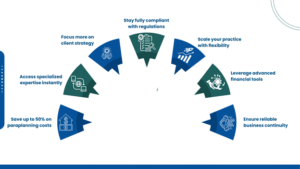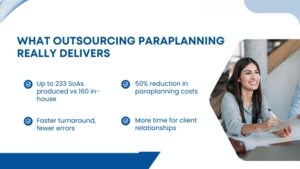Top 7 Benefits of Outsourced Paraplanning Services for Financial Planners
As a financial planner, your day is filled with client meetings, investment strategies, portfolio reviews, and keeping up with an ever-changing regulatory landscape. But there’s a part of your practice that often gets pushed aside: the technical, time-consuming work of paraplanning. That’s where outsourced paraplanning services come into play, a growing solution that’s helping financial planners improve efficiency, reduce costs, and maintain high service standards.
If you’ve ever wondered whether outsourcing your paraplanning is right for you, read on. Here are the top 7 benefits of outsourced paraplanning services and why more financial planners are making the switch.
What Is Outsourced Paraplanning?
Simply put, outsourced paraplanning services involve hiring external experts to handle the technical and administrative tasks of preparing financial plans, reports, and compliance documentation. Instead of having a paraplanner on your in-house team, you partner with a specialized service provider who delivers high-quality, accurate paraplanning work on demand.
These services include research, preparing recommendations, financial modeling, fact-finding document analysis, and ensuring compliance with the latest regulations. The key benefit? You get expert paraplanner support without the cost and complexity of managing another full-time employee.
If you’ve ever wondered whether outsourcing your paraplanning is right for you, read on. Here are the top 7 benefits of outsourced paraplanning services and why more financial planners are making the switch.

1. Cost Efficiency: Pay for What You Use
Hiring a full-time, in-house paraplanner comes with more than just a salary. There are recruitment costs, employee benefits, training, and office space to consider. With outsourced paraplanning services, you pay only for what you need, whether it’s a few reports a month or a full-time equivalent workload.
The outsourced paraplanning costs are generally much lower compared to the total expenses of an in-house paraplanner. This helps smaller firms or solo financial planners manage their budgets better without compromising on the quality of service.
2. Access to Specialised Expertise
It’s unrealistic to expect every financial planner to have deep technical paraplanning expertise. Fortunately, outsourced providers employ paraplanners who specialise in areas such as investment analysis, tax structuring, insurance review, risk profiling, and compliance research.
This means your clients get high-quality, in-depth reports and recommendations without you needing to spend hours doing detailed calculations or regulatory research yourself. The paraplanner support you get is often from professionals who have worked across multiple industries, bringing valuable insights and technical rigor that would be hard to replicate in-house.
3. Free Up Time to Focus on Strategic Advice
Let’s face it, most financial planners got into the business to help clients achieve their financial goals, not to spend hours drafting technical reports or researching the latest compliance regulations. Outsourcing paraplanning frees up your time so you can focus on strategic advice and building meaningful client relationships.
Rather than juggling spreadsheets, fact-finding questionnaires, and investment research, your time is spent where it matters most, growing your business and deepening client trust.
4. Better Compliance and Consistency
In today’s highly regulated environment, staying on top of compliance is non-negotiable. With paraplanning compliance constantly evolving, relying solely on internal resources can expose your business to compliance risks. Many firms find that paraplanning outsourcing is the best way to keep up with these constant changes.
By using outsourced paraplanning services, you gain access to experts who are always up-to-date with industry regulations, such as ASIC compliance in Australia or other local regulatory frameworks. This ensures your reports, recommendations, and documentation meet the highest quality and compliance standards, reducing the risk of costly mistakes or audits.
5. Scalability and Business Flexibility
Financial planning practices aren’t static. Some months are busier than others, especially during tax season or market volatility. Paraplanning services offer the flexibility to scale up or down based on your workload without the hassle of hiring or laying off staff.
Whether you need financial planning support for a few complex cases or consistent paraplanning help every week, outsourcing allows you to match your service level with your business cycle. This kind of flexibility is hard to achieve with an in-house team.
6. Leverage Advanced Technology
Top outsourced paraplanning providers use sophisticated financial modeling, risk analysis, and reporting tools that most small advisory firms wouldn’t invest in directly. These technologies automate repetitive tasks, speed up calculations, and help generate professional, consistent reports quickly.
This means your paraplanning output is not only faster but also more accurate and reliable. You get the benefit of advanced tools without having to invest in expensive software yourself, keeping your practice competitive in a tech-driven world.
7. Reliable Business Continuity and Peace of Mind
What happens if your in-house paraplanner suddenly leaves or falls sick? Business continuity can be a real challenge for small financial planning firms.
With outsourced paraplanning services, there’s no disruption to your workflow. Most service providers operate under strong Service Level Agreements (SLAs) and guarantee timely delivery of work, ensuring your business remains fully operational at all times.

Conclusion: Is Outsourced Paraplanning Right for Your Practice?
The paraplanning benefits are clear cost savings, access to expertise, improved compliance, time efficiency, scalability, advanced technology, and reliable business continuity. By outsourcing paraplanning, you gain a flexible and professional solution that helps you deliver higher-value advice to your clients without the burden of managing every technical detail in-house.
If you’re aiming to focus more on client strategy, grow your practice without adding overheads, and stay compliant in a changing regulatory landscape, it’s time to consider partnering with a reliable outsourced paraplanning provider.

